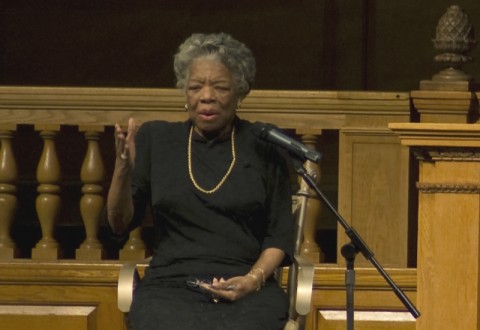The life of faith takes practice
Maya Angelou had it right: we can only try to be Christian.

Participants in new member classes at our church complete a personal information form at the end of the session. A box on the form prompts them to write down different “causes, passions, and commitments” that figure in their lives. Everything from tagging monarch butterflies to helping kids with disabilities learn to swim has shown up in that space. Last spring, a class participant wrote only four words in the box: “Trying to be faithful.”
I pondered those words late into the night. Was this woman embarrassed by a series of missteps in her life? Might there be an addiction? Since her husband wasn’t with her, was her marriage in trouble? As I’ve gotten to know her in recent months, the meaning has become clear. Marla isn’t interested in nominal Christianity with a thin religious veneer covering over motives and impulses that are anything but religious. She doesn’t want to see how little she can do in life and still be considered a Christian. Marla knows the Christian life is hard work.
Read our latest issue or browse back issues.
Living a life aligned with Jesus is extremely difficult. We practice and practice, trying to get even a few basics right. It’s mostly unglamorous work, as unglamorous as brushing teeth at the bookends of the day, or playing scales and arpeggios in endless fashion while learning the piano. I’m thoroughly convinced that nothing resembling expertise exists in the Christian life. How can you become an expert at receiving the totally undeserved mercy of God on a daily basis? What difference would brilliance make for allowing your heart to break more frequently for people who suffer? Exactly what kind of mastery would be necessary to live consistently in un-self-serving ways? There’s a reason we speak meaningfully of practicing the faith. It’s all practice.
“I’m working at trying to be a Christian and that’s serious business,” Maya Angelou once remarked. “It’s not something where you think, ‘Oh, I’ve got it done. I did it all day—hot diggity.’ The truth is, all day long you try to do it, try to be it. And then in the evening, if you’re honest and have a little courage, you look at yourself and say, ‘Hmmm. I only blew it 86 times. Not bad.’ I’m trying to be a Christian.”
When Martin Luther challenged the censure of his teachings by Pope Leo X, he leaned into the idea that life is a process of becoming. “This life is not righteous, but growth in righteousness; is not health, but healing; not being, but becoming; not rest, but exercise; we are not yet what we shall be, but we are growing toward it; the process is not yet finished, but it is going on; this is not the end, but it is the road; all does not yet gleam in glory, but all is being purified.” Luther’s contention that the Christian life is forever an unfinished product didn’t sit well with the powers that be. He was excommunicated from the church within months.
In a culture that prizes results, it’s not surprising that we celebrate speed and proficiency. But I’ll let Maya Angelou have this column’s last word: “I’m always amazed . . . when [people] walk up to me and say, ‘I’m a Christian.’ I always think, ‘Already? You’ve already got it? My goodness, you’re fast.’”
A version of this article appears in the print edition under the title “Trying to be a Christian.”







